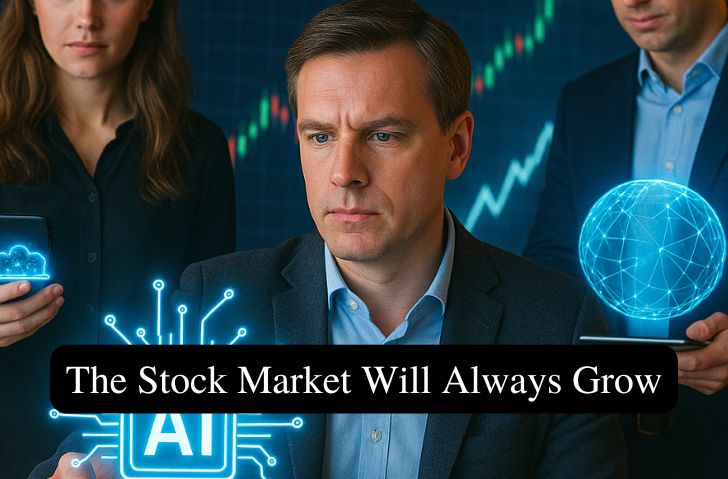Every so often, people wonder if it’s even worth investing in the stock market anymore. After all, hasn’t everything already been invented? We have cars, smartphones, streaming, medicine that cures diseases, and technology that connects the world in seconds. If the great inventions are behind us, what’s left to drive the market higher?
It’s a fair question—but it misses a key truth: human needs and the search for profit guarantee that innovation and business will never stop. And because innovation never stops, the stock market, over time, always finds a way to grow.The Market Is Built on Human Needs
At its core the economy, and by extension the stock market, exists because humans need products and services to survive and thrive. Food, shelter, energy, medicine, transportation, and communication aren’t optional. They are constants. Companies that meet these needs in new and better ways will always find customers, and investors will always reward them.
Consider how we’ve progressed just in the past century:
-
We went from horse-drawn carriages to electric cars.
-
From handwritten letters to instant video calls.
-
From antibiotics being a breakthrough to now exploring gene editing.
None of this happened because the world “needed more inventions.” It happened because people wanted solutions that were faster, cheaper, safer, and more convenient.
Innovation Is the Default, Not the Exception
Skeptics often assume that innovation is a rare spark—that every once in a while, a genius comes along with a world-changing idea. But in reality, innovation is baked into the DNA of capitalism. Businesses compete, and competition drives progress.
Take the smartphone as an example. The iPhone wasn’t the first cell phone. It wasn’t even the first touch-screen phone. But it reshaped an industry, created entirely new ones (apps, social media platforms, mobile payments), and continues to evolve year after year.
The same pattern repeats across history: electricity, railroads, automobiles, computers, the internet, AI. Each “finished” product spawns countless new markets and opportunities. The stock market doesn’t grow in a straight line because a single invention changes the world—it grows because one invention sets off a chain reaction of new businesses, industries, and technologies.
Profit Is a Powerful Engine
If necessity is the mother of invention, profit is its father. Companies are constantly looking for ways to cut costs, expand markets, and increase margins. That drive doesn’t just produce new gadgets—it transforms entire industries.
Think about energy. Coal once powered the world. Then oil. Then natural gas. Today, solar, wind, and nuclear energy are seeing explosive investment. Why? Not just because they’re cleaner, but because they’re profitable. Innovation follows money, and money chases innovation.
When you look at the stock market through this lens, it becomes clear: so long as there is a profit incentive, companies will innovate. And as they innovate, they create new growth, jobs, and investment opportunities.
But What If Growth Slows?
Yes, the market has downturns. Recessions, bubbles, and crises happen. But zoom out far enough, and the trend is undeniable: the stock market has always recovered and reached new highs.
The Dow Jones was under 100 in 1915. Today, it’s over 30,000. That growth wasn’t a straight path—it was marked by wars, depressions, oil shocks, inflation, and financial crises. Yet over time, the forces of innovation, business expansion, and human need kept pushing it upward.
When people say “everything has already been invented,” they’re ignoring the fact that each generation thinks the big inventions are already behind them. In the 1800s, some thought railroads were the peak of progress. In the mid-1900s, many thought airplanes and televisions were as advanced as life would get. And yet, here we are, discussing artificial intelligence, space exploration, and medical breakthroughs once reserved for science fiction.
Investing in the market isn’t about guessing the next invention—it’s about understanding that innovation never stops. Humans will always need better tools, better healthcare, better energy, better ways to connect. Businesses will always pursue profits by creating those solutions. And as long as that cycle continues, the stock market will always grow over time.
So the real question isn’t, “Has everything already been invented?” The real question is, “Can you afford to miss out on the next wave of innovation?”
Because history shows that even when it feels like the world has peaked, we’re just getting started.

